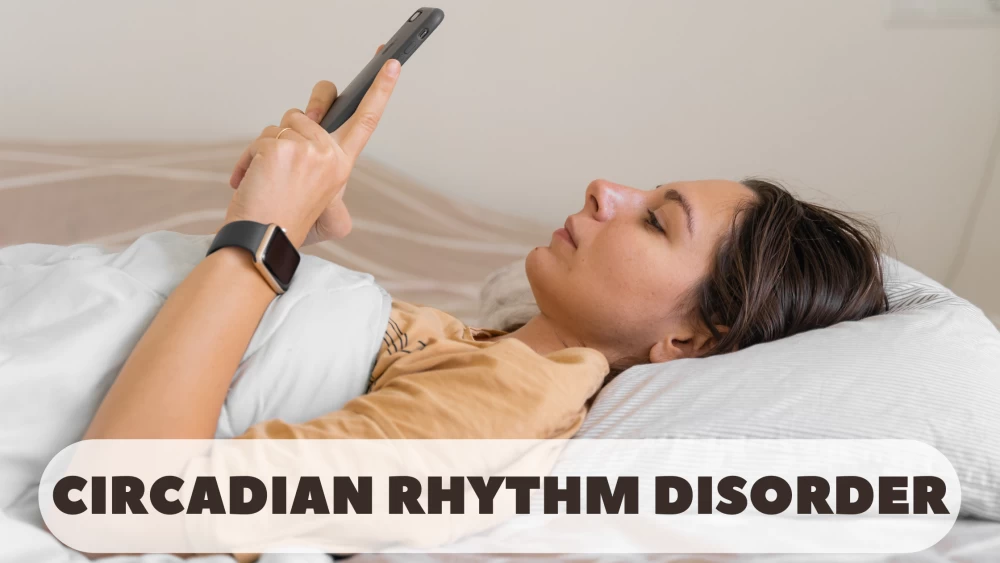
- 9th September 2022
Table of Contents
- Introduction
- What are circadian rhythm disorders?
- Diagnosing circadian rhythm disorders
- Symptoms associated with circadian rhythm disorder
- Other common symptoms associated with circadian rhythm disorder include:
- Some causes of circadian rhythm disorders:
- Treatment options for circadian rhythm disorder:
- Adapting to a healthier way of life to combat circadian rhythm disorder
- Use of Light for Medical Purposes
- Drugs and dietary aids
- Conclusion:
Introduction
Circadian rhythm disorders, or sleep-wake cycle disorders, occur when your body's internal clock is out of sync with your environment. Circadian clocks cycle every 24 hours. Circadian rhythms are 24-hour cycles. Your body tries to align your sleep-wake cycle with environmental cues like light and dark, eating, and activity. When your sleep-wake cycle is out of sync with your environment, you may have trouble sleeping. Having a circadian rhythm disorder means your sleep-wake cycle is disrupted.
Your sleep habits, job, or travel can cause temporary sleep disruptions. Or, aging, genes, or a medical condition can cause a long-term circadian rhythm disorder. Extreme daytime sleepiness decreased alertness, memory, and decision-making problems are symptoms.
Your doctor may ask about your sleep habits and recommend a sleep study and other tests to diagnose a circadian rhythm disorder. Your circadian rhythm disorder treatment depends on its type and cause. Improve your sleep habits to prevent circadian rhythm disorders. Untreated circadian rhythm disorders may cause health problems or workplace and road accidents.
What are circadian rhythm disorders?
You naturally feel more tired at night and more alert during the day due to your body's internal clock. The circadian rhythm describes the body's inherent 24-hour sleep-wake cycle. Light and dark, mealtime, and exercise are all examples of environmental cues that it responds to. A circadian rhythm disorder could be defined as one in which this cycle is disturbed. Daytime sleepiness and depression are just two of the possible side effects of this. Attempts to establish a regular sleep routine have shown promise for easing symptoms.
Common Circadian Rhythm disorders
- Rapid time zone change syndrome (jet lag). Cross-time zone travelers experience sleepiness and lack of daytime alertness. Each time zone crossed is worse, especially traveling east.
- Shift work sleep disorder. This disorder affects shift workers and night workers. A person's circadian rhythm and shift time can cause them to sleep 4 hours less than the average person.
- Sleep phase delay (DSPs). Sleep disorder. DSPS patients fall asleep late and have trouble waking up for work, school, or social events. Teens and young adults are especially affected.
- Asp syndrome (ASPS). This disorder causes people to sleep and wake up early. Between 6 and 9 p.m., for example. 1-5 a.m. Non-24 sleep-wake disorder. This disorder often affects people who are blind because the circadian clock is set by the light-dark cycle. This disrupts the cycle. It causes poor nighttime sleep and daytime sleepiness.
- Sleep-wake disorder. This disorder jumbles circadian rhythms. They may take 24 naps.
Diagnosing circadian rhythm disorders
A sleep specialist is often needed to diagnose circadian rhythm disorders. Your healthcare specialist will ask you to keep a one- to two-week sleep diary. Your doctor will also rule out narcolepsy, which mimics delayed sleep phase disorder.
Sleep diaries are often used with an actigraph, which records sleep and wake activity over days to weeks. Overnight and daytime sleep studies are sometimes needed. Individual sleep patterns are considered in sleep studies. Shift workers may have an "overnight" sleep study during the day. Other tests include measuring body temperature and melatonin.
Symptoms associated with circadian rhythm disorder
-
Slumbering
-
Too-early waking and inability to fall back asleep
-
Unrefreshed by sleep
-
Daytime vigor
Other common symptoms associated with circadian rhythm disorder include:
-
Unfocused
-
Cognitive impairment
-
Disorganized
-
Headaches
-
Constipation
-
CRD Causes
Some causes of circadian rhythm disorders:
-
Work shifts
-
Pregnancy
-
Timezones
-
Medications
-
Routine changes like staying up late or sleeping in
-
Alzheimer's and Parkinson's
-
Depression
-
Menopause
Treatment options for circadian rhythm disorder:
The goal of treating circadian rhythm disorders is to realign your sleep-wake cycle with the external time zone. The diagnosis and severity of your circadian rhythm disorder will determine the course of treatment. Adjustments to one's way of life, exposure to bright light, and melatonin are the most frequently used treatments. Your healthcare provider may advise you to try a few different approaches.
Adapting to a healthier way of life to combat circadian rhythm disorder
-
Your doctor may advise you to establish a daily routine with specific daytime activities and nighttime routine activities to help reset your sleep-wake cycle. This may be useful in the treatment of disorders of the circadian rhythm.
-
If you work shifts or sleep at odd hours, it is essential to stick to a regular eating and sleeping schedule.
-
Establish a nightly ritual of retiring to bed. Try to find a cool, dark, quiet place to sleep and establish a nighttime routine that helps you wind down and reduces stress. Combining them with set bedtimes and wake times may sleep more soundly and for longer periods.
-
Stay awake in the afternoon and stay away from naps during the day. However, a quick rest before starting a shift can be helpful for shift workers.
-
Perform a regular physical activity. Regular exercise is good for your health, but it's best to schedule it during the day, when you're more likely to feel energized, rather than right before bed, when you might find it harder to drift off.
-
Avoid consuming stimulants like coffee, alcohol, or nicotine as well as certain medications right before bed.

-
Keep your light exposure in check. Light is nature's most potent cue for resetting your circadian rhythm. Perhaps you would benefit from less time spent in front of the TV or using other electronic devices after dark and more time outside in the sunshine during the day. Reduced melatonin production from exposure to artificial light has been linked to insomnia. Dim the light from your electronic devices with the help of light-blocking glasses, screen filters, or smartphone apps. The effects of a circadian rhythm disorder may be mitigated by exposure to dim light for a time before bed. When working shifts, it may be helpful to wear sunglasses that filter out bright sunlight.
Use of Light for Medical Purposes
Certain disruptions of the circadian rhythm can be helped by light therapy, which your doctor may recommend. In this method, you schedule regular sessions in front of a light box that simulates natural sunlight. Visors and glasses with minimal glare could be useful as well. The production of melatonin can be modulated through light therapy to realign one's sleep-wake cycle.
- If you use the lightbox when you first get up in the morning, you can adjust your sleep and wake schedules for the better. The possibility of less daytime sleepiness is another benefit. If you suffer from delayed sleep-wake phase disorder, irregular sleep-wake rhythm disorder, or jet lag disorder after traveling to the east, this technique may be helpful.
- Use the light box in the late afternoon or early evening to shift your sleep and wake times. In the case of advanced sleep-wake phase disorder, shift work disorder, and westward travel-related jet lag, this technique may help alleviate symptoms.
Light therapy has potential adverse effects such as irritability, eye fatigue, headaches, migraines, and nausea. If you have an eye condition or take medications that cause you to be sensitive to light, talk to your doctor before beginning light therapy.
Drugs and dietary aids
If you need help getting your sleep/wake schedule in sync with your environment, your doctor may suggest melatonin supplements or medications.
- Non-24-hour sleep-wake disorder can be treated with melatonin medication known as melatonin receptor agonists. Dizziness and tiredness are two of the possible side effects.
- Supplemental melatonin, a synthetic version of the sleep hormone, may be prescribed by your doctor if you suffer from delayed sleep-wake phase disorder, irregular sleep-wake rhythm disorder, or a non-24-hour sleep-wake rhythm disorder. There may be variations in dosage and purity between different brands. If you are pregnant or trying to conceive, you should talk to your doctor about the best ways to find safe, effective melatonin supplements, as well as any potential side effects or medicine interactions. Excessive drowsiness, headaches, high or low blood pressure, stomach upsets, and worsening depression are all possible side effects of melatonin.
The symptoms of circadian rhythm disorders may respond to treatments besides those prescribed by your doctor.
- If you find yourself getting sleepy during the day, caffeine may be able to help. To help you sleep better, your doctor may suggest you avoid caffeine for at least eight hours before bedtime.
- Medications designed to aid sleep, such as benzodiazepines and zolpidem, can shorten the time it takes to get to sleep and increase the amount of time spent asleep. Side effects and complications from these medications, such as muscle weakness and confusion, may be amplified in the elderly and those with dementia.
- You can stay awake and perform better on the job by taking a wake-promoting drug like modafinil or armodafinil between shifts. These medications may only have a temporary effect, and you may still feel drowsy even after taking them.
Conclusion:
Sleep is essential to good health. The increased risk may be present if you have a circadian rhythm disorder like depression, lessened resistance to illness, diabetes, disorders of the heart and blood vessels, vehicle collision, difficulty focusing on tasks at hand.
You may be able to adjust your sleep schedule by making some minor adjustments to the amount of light you're exposed to before bed and the amount of light you're exposed to in the morning.














